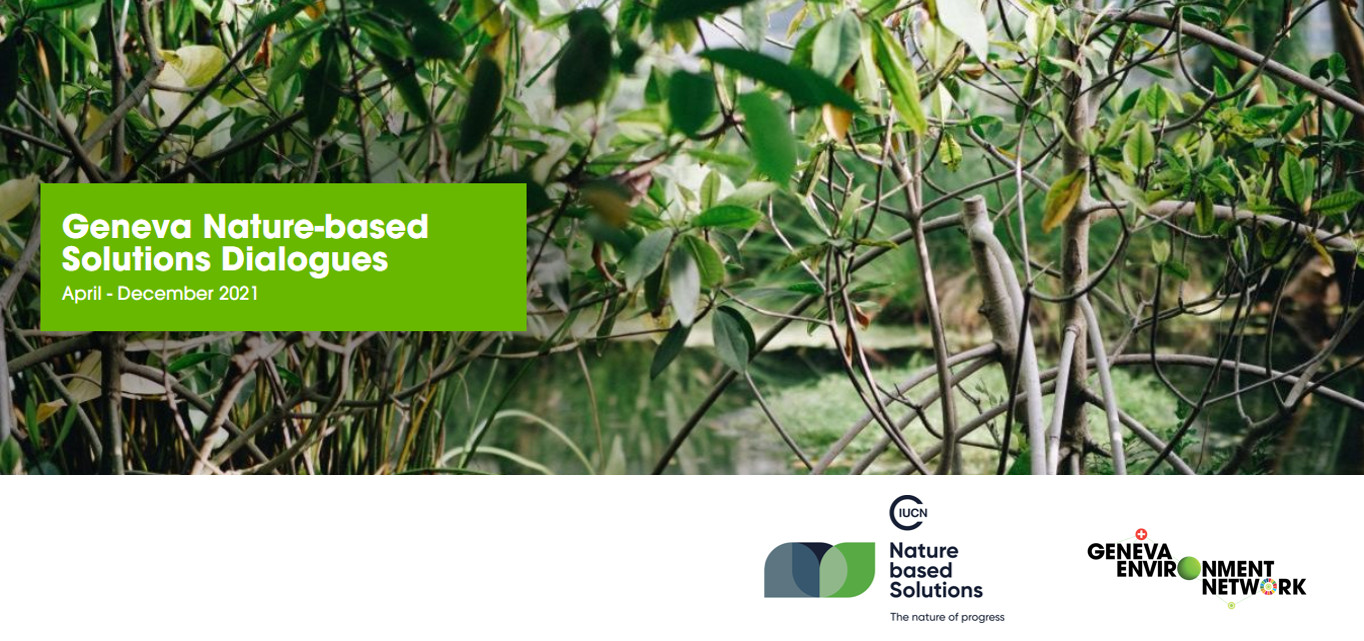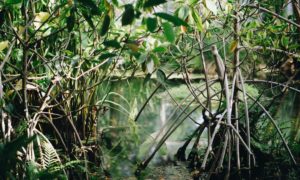Nouvelle
Geneva Nature-based Solutions Dialogues
The Geneva Nature-based Solutions dialogues aim to facilitate further engagement and discussion among the stakeholders in International Geneva and beyond, in the lead-up to a critical year for nature and society. This NbS journey brought together multiple actors from the Geneva International Community to establish a common understanding, set an open dialogue and share perspectives. The dialogues are convened by the Geneva Environment Network and the International Union for Conservation of Nature (IUCN).

About the Dialogues
We are facing a triple planetary crisis – climate change, nature loss and pollution. Unsustainable human activities, from farming and mining to industry and infrastructure, are exacerbating the negative impacts of this crisis and undermining both soil biodiversity and ecosystems health. This degradation threatens food security, water supplies and the biodiversity upon which human society depends on. Nature-based Solutions (NbS) can contribute to address these challenges. As per IUCN definition, NbS are actions to protect, sustainably manage and restore natural or modified ecosystems that address societal challenges effectively and adaptively, simultaneously providing human well-being and biodiversity benefits.
NbS are a powerful tool to facilitate and catalyse the engagement of cross-sectoral stakeholders to join forces towards the implementation of an ambitious Post-2020 Global Biodiversity Framework. This framework, which will replace and must improve on the Strategic Plan for Biodiversity 2011-2020, is must be ambitious to commensurate with the threats facing biodiversity and must deliver the transformational change that is needed to put nature on a path to recovery by 2030 and achieve the 2050 Vision of “Living in Harmony with nature”. NbS also offer a pathway for synergies among several multilateral environmental agreements, including for biological diversity (CBD), climate change (UNFCCC), disaster risk reduction (Sendai Framework), desertification (UNCCD) and the wider Sustainable Development Goals (SDGs) – and for mainstreaming nature conservation into sectoral decision-making processes.
Within the Paris Agreement, countries have engaged themselves in the creation of Nationally Determined Contributions (NDCs), aiming to embody their efforts to reduce national emissions and adapt to the impacts of climate change. NbS can be part of these actions as it provides various solutions to mitigate climate change effects. Nature has indeed an immense restorative power and offers some of the most cost-effective climate solutions. By working with nature, we have the potential to reduce emissions by more than a third of what is needed by 2030.
The year 2021 marked a turning point towards a resilient world for future generations, with several more important meeting upcoming in 2022. In this context, NbS offer an opportunity to address a wide range of urgent societal challenges. Major upcoming negotiations that address NbS include:
- IUCN World Congress in September 2021
- UN Food Systems Summit in September 2021
- UN Biodiversity Conference in October 2021 and 2022
- UN Climate Change Conference in November 2021
- UNEA-5.2 in February 2022
- UN Ocean Conference in June 2022
Throughout this critical year for nature and society, The Geneva Environment Network and the International Union for Conservation of Nature embarked in a one-year journey, where experts from all over the world and different sectors discuss how NbS are relevant to various debates ongoing in Geneva and beyond. Each dialogue also drew linkages with specific conferences, meetings, campaigns, international days and more, thus providing highly relevant reflections on the role of NbS to address the key challenges of our times.
Although the dialogues target stakeholders from all continents, they aim to encourage increased engagement of the Geneva community in the run-up to relevant negotiations on the global environmental agenda. This one-year journey is an opportunity to learn more about the technical know-how to design and implement innovative NbS to tackle and solve the current challenges the human society is facing. A journey to learn and listen about the lessons learned, technical challenges and capacity gaps to successfully transition into a more resilient and sustainable future for nature and people.
Conveners
The Geneva Environment Network is a cooperative partnership of more than 100 environmental and sustainable development organizations based in Geneva. Established in 1999, the Geneva Environment Network organizes events and promotes awareness on environmental issues. The Secretariat is supported by the Swiss Federal Office for the Environment and is administered by the United Nations Environment Programme.
The International Union for Conservation of Nature is a membership Union composed of both government and civil society organizations. It harnesses the experience, resources and reach of its more than 1,400 Member organizations and the input of more than 17,000 experts. This diversity and vast expertise makes IUCN the global authority on the status of the natural world and the measures needed to safeguard it.
Outcomes
Throughout 2021, the dialogues brought together multiple actors from the Geneva international community and beyond to establish a common understanding and set an open dialogue. More than 80 speakers, representing all regions in the world, shared their perspective and insights on the role of NbS for addressing global challenges, as well as opportunities and pitfalls to mainstream and scale-up NbS interventions. The dialogues reached almost 1’000 people from various sectors and across the globe.
The dialogues demonstrated that NbS can contribute to address the challenge of meeting our needs without further jeopardizing the health of our planet. Well-designed NbS can help address pressing societal challenges such as biodiversity loss, climate change, food and water security, disaster risk reduction, socio-economic development, and human health. As many countries focus on economic relief and recovery efforts in the aftermath of the COVID-19 pandemic, ensuring that the recovery is sustainable, green, and replicable as much as possible has been recognized globally. The potential of NbS in this context is tremendous. NbS provide cost-effective solutions that reap wide benefits across a range of issues. Investing in NbS will also be less costly than paying the price of non-action.
Addressing societal challenges in a holistic and collaborative way requires to break silos. Bringing together actors from the conservation sector and beyond can help us see where we can take action to move to a just and more equitable future for all, particularly for future generations. Thus, it is important to encourage partnerships and solidarity at all levels towards the achievement of our goals. The dialogues further highlighted the need to advocate for transdisciplinary research and to integrate knowledge from different scientific and non-scientific stakeholders and communities. Developing an inclusive understanding of NbS is crucial to halt biodiversity loss, while simultaneously enhancing human well-being and safeguarding human rights. In particular, the rights of indigenous people, who have been custodians of nature for centuries, as well as their knowledge, systems and practices must be central to NbS. NbS must include all relevant stakeholders, including local communities, women, youth and the private sector.
Humanity’s destruction of nature is driving numerous risks to human and planetary health. The COVID-19 pandemic further highlighted the consequences of our broken relationship with nature. The growing momentum for NbS is a critical opportunity to reframe our understanding of the relationship between people and nature by emphasizing that people are part of nature. By improving our relationship with nature, we can jointly walk towards a common goal, a just and more equal future that responds to the challenge of climate emergency and biodiversity loss. NbS offer an inclusive and holistic framework — based on solid environmental and social safeguards — to uphold human rights and enable a transition to this common goal.
Thematic outcomes
The dialogues provided rich insights into specific aspects of NbS through dedicated sessions. Summaries for each session and supporting documents are available below.
- Nature-based Solutions and Health | 26 April 2021
- Nature-based Solutions and Ecosystems Restoration | 7 June 2021
- Nature-based Solutions and the Post-2020 Biodiversity Framework | 28 June 2021
- Nature-based Solutions for Socio-Economic Growth | 30 August 2021
- Nature-based Solutions and Food | 13 September 2021
- Nature-based Solutions and the Ocean | 27 September 2021
- Nature-based Solutions for Building Resilience | 11 October 2021
- Nature-based Solutions and Cities | 25 October 2021
- Nature-based Solutions and Peacebuilding | 1 November 2021
- Nature-based Solutions and Water | 22 November 2021
- Nature-based Solutions and People | 6 December 2021
More on Nature-based Solutions
Our Nature-based Solutions update lists relevant information, research, data and/or press releases issued by our partners in Geneva and other institutions around the world.

